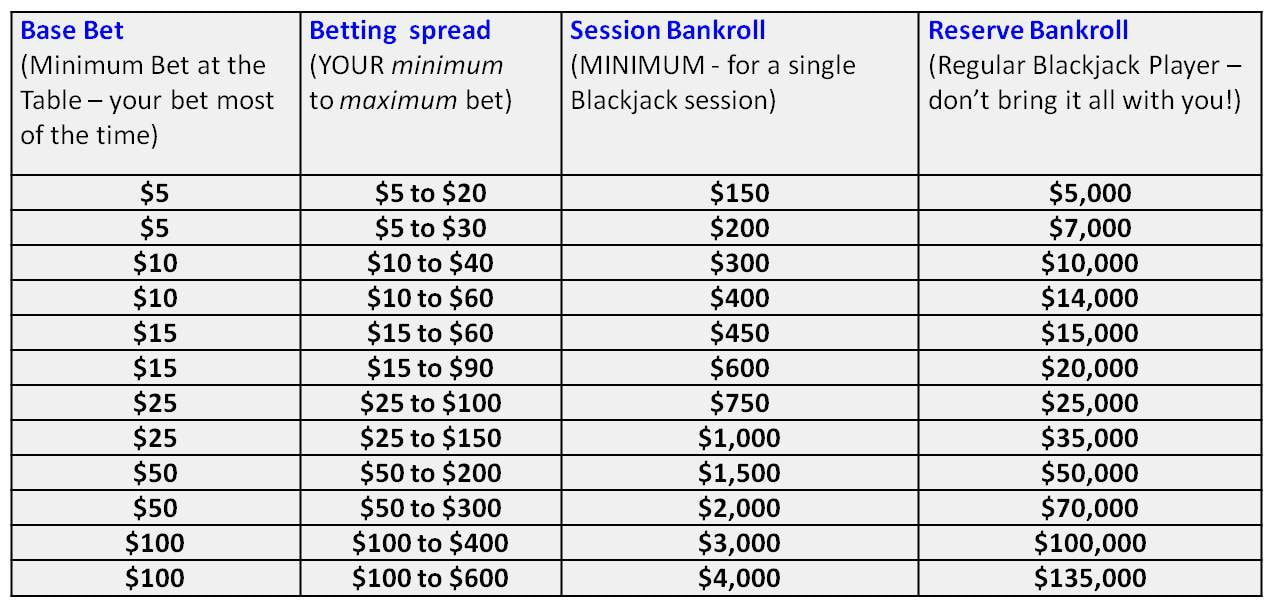Blackjack bankroll management

Blackjack Bankroll Management. Proper blackjack bankroll management involves controlling your gambling capital and determining the stakes to play that will. The Ultimate Blackjack Book: Basic Strategies, Money Management, and More [Thomason, Walter] on bravadoaustralia.com.au *FREE* shipping on qualifying offers. Money management in blackjack does not involve setting goals for profit or determining loss limits, neither does it circle around raising or reducing your. A good rule of thumb, to avoid this happening, is to have a maximum bet size of 10% of your blackjack bankroll. Blackjack bankroll management $, that'd mean 10 x $
Are Your Bets Too Big for Your Bankroll?
What tables not to play in blackjack? Any player should avoid playing a 6:5 blackjack table for a very simple reason; the casino holds a major advantage because the overall payout will never be in the player's favor (ex. a $10 bet pays $12).
How much money should you bring to a blackjack table? Just a few bad hands will wipe you out. But if you can afford a few more minimum bets, you can weather a small run of bad luck. A good rule of thumb is a bankroll of at least 20 times the table minimum, and preferably 40 times. That means you should bring at least $100 dollars to a $5 table, and $500 to a $25 table.
Is blackjack pays 3 to 2 or 6 to 5? What's The Difference? The difference between 3:2 blackjack and 6:5 blackjack is simple. If you have a winning blackjack hand, you get paid 3 dollars for every 2 that you bet, or 1.5:1 odds. In 6:5 you get paid $6 for every $5 you bet, which is 1.2:1 odds.
Money Management in Blackjack
The same strategies can be useful for you. The basic premise of bankroll management is simple. You want to bet big enough to maximize profit when the gambling gods are with you, but you also want to bet small enough to minimize risk and keep yourself in the game when you catch a bad run. Good and bad streaks are inevitable, but you cannot be a winner if you bust out and stop playing five minutes before a hot streak begins.
How much should you bet. How big should your bankroll be in relation to the size of your bets. On five-dollar slots and above, bets should keep you going up to three hours. Note that the number of bets needed for your session bankroll goes down on slot machines as the denomination increases. Blackjack and other table games are best played with a minimum of 50 bets.
The only exception to this rule is Let It Ride, which requires bets see my Playing the Tables column in this issue for an in-depth discussion of Let It Ride. Why are table game bankrolls smaller compared to slots. Most table bets pay , or sometimes or In contrast, slot games have jackpots that pay 1,, 10,, and even more.
The money for those big jackpots has to come from somewhere. Games with big payoffs tend to have fewer small wins and longer stretches of losing. When calculating the size of your bankroll, also keep in mind that an average bet is not necessarily the lowest bet. Similar caveats apply if you cover a lot of numbers in roulette and craps, or play two or three spots in blackjack.
If you want to survive the streaks and win the max, be sure your bankroll and bets are in proper proportions to each other. Got a question. Visit SmarterBet. Blackjack bankroll management Editorial Staff Posted on October 28, Win more, and play longer, by using these money management tactics by Basil Nestor He was a young, fresh-faced guy. Size Matters The basic premise of bankroll management is simple.
This could be the table minimum or a higher bet, depending on the personal bankroll. As we have said above, the recommended bankroll for a gaming session is at least 50 times the minimum bet or 50 betting units. While this may seem a lot for many, such a bankroll would be more effective in covering the hands you would inevitably lose.
The higher the bankroll, in terms of betting units, the longer you would play and the less likely you are at losing everything. Another term used in blackjack literature is the betting spread — this is the range of different bets you are making throughout the game.
It is mainly used by card counters but it is also a helpful tool for money management in standard, basic strategy play. Typically, the player starts the game with 1 betting unit and at some point, he or she would decide to place a higher wager. A good, conservative betting spread would be where the minimum bet is 1 unit and the maximum bet is 10 units. Most players even prefer lower spreads of up to or In card counting, the betting spread is essential in guaranteeing better profits — players bet the minimum when the house has the advantage and they bet the maximum when the advantage shifts in their favor.
For those who are not skilled enough to track the deck and count the cards , the betting spread of little importance. Still, they could use it to control the money they are spending. To manage their bankrolls properly, all gamblers should have at least a basic understanding of the house edge and the expected value.
This way, they would know how much they are expected to win or lose per given period of time.  As we have said above, blackjack is a negative expectation value, which means that players would eventually lose, while the casino is guaranteed to win over the long haul. It varies greatly from one blackjack variation to the other due to the different rules, the number of decks, the various payouts, side bets available, etc.
As we have said above, blackjack is a negative expectation value, which means that players would eventually lose, while the casino is guaranteed to win over the long haul. It varies greatly from one blackjack variation to the other due to the different rules, the number of decks, the various payouts, side bets available, etc.
Interestingly, the house edge changes dramatically throughout the game, as well, as the deck composition changes — with more low cards left unplayed, the house edge is higher, when more high cards remain in the shoe, the house edge may even be negative. This means that players would have the advantage.
However, that is something only card counters would be able to detect, which is why we would not focus on it. So, what is the house edge in the standard blackjack variation. When played under traditional Vegas rules, the game offers a mathematical advantage of less than 0. Usually, casinos offer 8-deck blackjack, where the dealer Hits Soft 17, players can double on any two cards and after a split, up to three splits are allowed, blackjack pays , and there is no Surrender option.
Under these conditions, the house edge will be around 0. But the house advantage cannot predict how much you will win or lose in a given period of time since it is a theoretical unit that is true for an unlimited number of hands. This is why we need to know the so-called expected value EV of the game.
It helps players determine their expected loss or win for a gaming session and based on the amount they bet. To calculate the negative EV, we simply use the formula:. Considering we play a game with a 0. This is also the hourly loss of the player. Another fundamental concept in blackjack theory is the so-called Risk of Ruin ROR , which refers to the chance of losing your entire bankroll.
The math behind calculating these odds is extremely complicated and no single formula for ROR exists. The exact amount of the bankroll that is big enough to reduce the ROR to insignificant percentages depends on the monetary value of the bet. However, these ROR percentages have been calculated for a game with no limits on the number of hands played and no point of quitting.
When calculated for a specific number of hands, the ROR is much lower , however. If we play 1, hands, our ROR will be around 1. Some of these betting methods are quite popular among recreational players, while others are applied only by blackjack pros. Progressive betting systems are extremely popular among gamblers — they can be used in blackjack, roulette, and many more.
They are fundamentally wrong, however, since they make use of winning and losing streaks. Usually, these systems require players to increase or decrease their bets based on previous outcomes. The idea is that you could win a lot when you are on a winning streak.
Your wins will eventually help you recover your losses. This is one of the common misconceptions in gambling and blackjack pros know well that relying on streaks is not an effective strategy in the long term. There is even a betting system using the Fibonacci sequence of numbers although it has no relation to blackjack or gambling at all.
One of the betting styles is known as the Up and Pull Method. It is used primarily by recreational and beginner-level players and it is based on the so-called winning and losing streaks. Using it, players start their game with 2 betting units and if they lose, they reduce their bet to 1 unit.
If another loss occurs, they start again with 2 units. On every win, the bet increases by 1 unit and whenever the player loses, he goes back to the start. Although some players consider this way of betting a method, it is, in fact, a betting progression using the following sequence — 2, 2, 3, 4, 5, 6, 7, etc. The idea is to maximize the winnings from several consecutive wins and recoup any losses.
This is why the Up and Pull is actually a progressive betting system , which we have already discussed. Since there is no mathematical proof of its effectiveness, it is avoided by professional blackjack players. Chargers 1st round draft pick Card counters never use progressive betting systems but they do use methods to structure their wagers in a way that it can bring them the greatest profits.
The good betting spread is instrumental in the success of any card counting system.